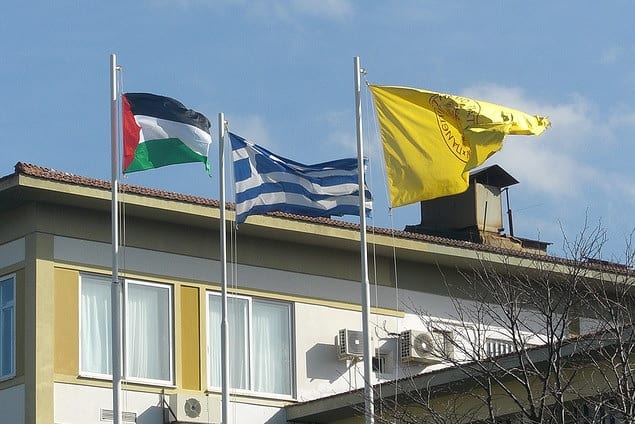Greek Foreign Affairs Minister George Gerapetritis and his Palestinian counterpart Riyadh al-Maliki discussed in a phone call the need to prevent the escalation of the crisis in the Middle East at a regional level, the Foreign Affairs Ministry announced on Monday.
The ministry said the two officials also agreed to maintain an open communication channel on developments in the Middle East.
Gerapetritis also referred to the five-point plan for managing the crisis he had presented earlier this month, which found Riyadh al-Maliki in agreement and emphasised the need to open humanitarian corridors and protect civilians.
The Greek foreign minister had presented the plan during the Ministers of Foreign Affairs meeting of the Gulf Cooperation Council and the European Union held in Muscat (Oman) on October 9-10.
Gerapetritis’ phone call with his Palestinian counterpart comes as Prime Minister Kyriakos Mitsotakis is expected to visit Israel in the coming days, according to sources. The sources on Monday stressed that if the visit takes place, it will be strictly bilateral and not a part of some European Union initiative.
Earlier the same day, during a phone conversation, Mitsotakis and the President of Turkey, Recep Tayyip Erdoğan, discussed the Israeli-Hamas war.
During the telephone call, according to the announcement of the prime minister’s office, “the two leaders discussed the latest developments following the terrorist attacks by Hamas against Israel and the situation in the Gaza Strip.”
“The Prime Minister underlined the need to avoid a humanitarian crisis and not to threaten regional stability,” the announcement added.
Germany’s Scholz warns Iran, Hezbollah not to intervene in conflict
German Chancellor Olaf Scholz on Tuesday warned Iran and Lebanese militant group Hezbollah not to become involved in the ongoing Israel-Hamas hostilities.
“I expressly warn Hezbollah and Iran not to intervene in the conflict,” Scholz said Tuesday, in commented reported by Reuters. He spoke after a meeting with Jordanian King Abdullah in Berlin.
Scholz is expected to visit Israel in an expression of solidarity on Tuesday, according to domestic and international media reports — a day before the scheduled arrival of U.S. President Joe Biden.
The international community has largely condemned the Oct.7 terrorist attacks perpetrated by Iran-backed Palestinian militant group Hamas, with fear now mounting over a potential spill-over of the conflict into the wider Middle East following repeated fire exchanges between Israel and Hezbollah.
Iran’s foreign minister on Monday evening warned that so-called resistance groups could take “pre-emptive action” against Israel in “the coming hours,” without supplying details.
Nearly half a million Israeli people displaced, military says
Roughly half a million Israeli people have been internally displaced, largely “at their own merit and at their own initiative” to avoid civilian damage in the ongoing conflict with Palestinian militant group Hamas, Israeli Defense Forces spokesperson Jonathan Conricus said during an overnight press update.
“We’ve evacuated all of southern Israel close to the border, close to Gaza. Most of Sderot has been evacuated, parts of Ashkelon has been evacuated, and those are cities with tens of thousands of people,” he said, noting that official evacuation instructions have now been sent to Sderot and other communities near the Gaza Strip , while the residents of more than 20 Israeli settlements in the north have been displaced.
Israel’s Ministry of Defense on Monday said it would evacuate civilians from 28 communities near northern Israel up to 2 kilometers (1.24 miles) from the Lebanese border to state-funded guesthouses.
The internal Israeli displacements come amid an anticipated Israeli ground incursion into the Gaza Strip, along with ongoing fire exchanges with Lebanese militant group Hezbollah since last week.
They also come around the same time as evacuations in the embattled Gaza Strip, where more than 1 million people — or nearly half the local population — were internally displaced, the United Nations Relief and Works Agency for Palestine Refugees said in its latest report on Monday.
The U.N. expressed alarm at the Israeli military’s evacuation directive to the 1.1 million residents of northern Gaza and warned it was “impossible” for such a human movement to take place without “devastating humanitarian consequences.”
READ MORE: Greece “strongly condemns” heinous terrorist attack in Brussels that left 2 Swedes dead.

